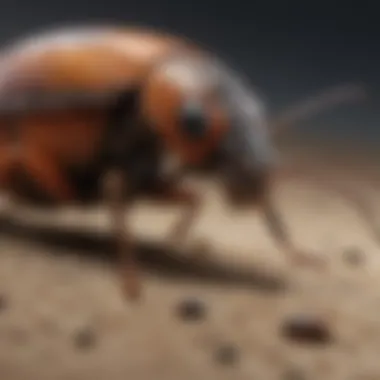Effective Pest Management Strategies in Hudson, FL


Intro
Pest management is a critical concern for homeowners in Hudson, Florida. The combination of climate and environment in this region creates conditions conducive to various pests. Understanding these pests, their behavior, and effective management strategies is essential for maintaining a comfortable home.
The following sections will provide insights into identifying common pests, applying prevention methods, and utilizing DIY control solutions. This guide aims to equip residents with knowledge and tools for effective pest management, encouraging sustainable practices that contribute to a healthier living environment.
Pest Identification
Identifying pests is the first step toward effective pest management. In Hudson, some household pests are notably prevalent.
Common Household Pests
- Ants: These invaders often enter homes in search of food. Common species in Hudson include the Argentine ant and the fire ant.
- Roaches: The American cockroach and the German cockroach thrive in moist environments and can spread diseases.
- Termites: Eastern subterranean termites are a significant concern for wooden structures.
- Mosquitoes: These pests breed in standing water and are a nuisance during the warmer months.
Signs of Infestation
Being able to identify an infestation early can save time and money. Look for:
- Droppings and residue: Small dark droppings may indicate rodent activity.
- Nests or hives: Finding a nest suggests that pests have taken up residence.
- Damage: Look for signs of chewing, frayed edges, or damage to wood, indicating possible termites or rodents.
- Unusual sounds: Scratching or skittering noises, especially at night, can signal rodent presence.
Prevention Methods
Preventing pest invasions begins with proper home maintenance and environmental modifications.
Environmental Modifications
- Eliminate standing water: This action helps control mosquito populations.
- Seal entry points: Inspect doors, windows, and vents for gaps to deter pests like ants and roaches.
- Maintain landscaping: Keep plants trimmed and avoid dense vegetation close to the house.
Home Maintenance Tips
- Regular cleaning: Keep food stored properly and dispose of garbage frequently.
- Inspect wood: Check for signs of deterioration that may attract termites.
- Store firewood away: Keep firewood stacked at least 20 feet from the home to minimize termite risk.
DIY Pest Control Solutions
Many homeowners in Hudson prefer DIY solutions for pest control. These methods can be economical and effective.
Natural Remedies
Some natural remedies include:
- Diatomaceous earth: This natural powder disrupts the exoskeletons of insects, leading to dehydration.
- Vinegar: A solution of vinegar can deter ants and roaches when sprayed around entry points.
- Peppermint oil: This essential oil can repel spiders and mice effectively.
DIY Traps and Barriers
Creating traps can help manage pest populations. Here are a few options:
- Homemade bait traps for ants: Use equal parts sugar and borax to attract and eliminate ants effectively.
- Simple rodent traps: Construct simple traps using wood and a bait system.
- Physical barriers: Screens for windows and doors keep pests out while allowing airflow.
Understanding pests and implementing effective management strategies is vital for a healthy home. Residents should remain alert and proactive in their approaches to pest control.
Intro to Pest Management in Hudson, Florida
Effective pest management is a critical concern for many homeowners in Hudson, Florida. The region's unique climate and environment create a suitable habitat for various pests. Understanding the significance of pest management is vital for maintaining a healthy living space.
Pest management involves strategies to prevent and control pest populations. It is not just about eradicating these intruders; it's about understanding their behaviors and how they interact with the environment. Effective management can lead to several benefits, including improved hygiene, protection of property, and enhanced quality of life.
In Hudson, the warm climate provides opportunities for pests such as rodents, cockroaches, termites, and mosquitoes to thrive. These pests can damage homes, pose health risks, and disrupt daily activities. Hence, knowing how to identify and manage these threats is essential for homeowners.
Key considerations for pest management include:
- Awareness of local pests and their behaviors.
- Preventive measures to reduce infestations.
- Sustainable practices that protect the environment.


This article will explore these elements in detail, equipping residents with the knowledge needed for effective pest management in Hudson. By taking a proactive approach, homeowners can reduce their vulnerability to pests, ensuring their homes remain safe and comfortable.
Understanding Common Pests in Hudson
Understanding common pests in Hudson is crucial for effective pest management. This segment provides insight into the various types of pests that inhabit the region, their habits, and the specific conditions that attract them. By recognizing these pests, homeowners can take proactive measures to prevent infestations before they require extensive control methods.
Identifying the pests present in Hudson enables residents to tailor their management strategies according to local conditions. For instance, the warm climate provides a suitable environment for various pests, increasing their activity during certain seasons. Knowing when and how these pests behave can help in developing effective prevention plans.
Rodents: A Persistent Issue
Rodents, particularly the common house mouse and the Norway rat, are prevalent in urban and suburban areas of Hudson. They thrive in environments that provide food, water, and shelter. Rodents can reproduce rapidly, leading to significant populations if left unchecked. Their presence poses health risks through potential transmission of diseases.
To manage rodent issues effectively, homeowners must conduct regular inspections for signs of infestations, such as droppings or gnaw marks. Sealing entry points into the home is essential. Common methods include using metal mesh and caulking gaps around pipes and vents.
Cockroaches: Identifying the Culprits
Cockroaches are known for their resilience and adaptability. The American and German cockroach are two species often found in Hudson homes. They prefer warm, humid environments and are frequently located in kitchens or bathrooms. Cockroaches can survive on minimal resources, making them hard to eliminate once they settle in.
Identifying cockroaches involves looking for their distinctive oval shape, long antennae, and rapid movement. Homeowners can reduce their appeal by maintaining cleanliness, fixing leaks, and ensuring food is stored properly.
Termites: Silent Destroyers
Termites are perhaps one of the most destructive pests that can invade a home. The Eastern subterranean termite is common in Florida, causing significant structural damage. These insects are often undetected until extensive damage has occurred. They thrive in moist soil and can access homes through cracks in foundations or wooden elements.
Regular inspections are vital to identify potential signs of termite activity, which may include mud tubes on walls or hollow-sounding wood. If infestation is suspected, it is crucial to consult a pest professional for effective treatment options.
Ants: Social Insect Dynamics
Ants, particularly fire ants and carpenter ants, can be a nuisance in Hudson. They are social insects that live in colonies, which makes them challenging to control. Fire ants can pose painful stings, while carpenter ants can damage wooden structures.
Identifying ant trails can help homeowners locate nests. Prevention strategies include eliminating food sources and sealing nests found in or around the property.
Mosquitoes: The Local Menace
Mosquitoes are a significant concern in Hudson due to their association with disease transmission. They breed in standing water and are most active at dusk and dawn. Their bites can cause allergic reactions and discomfort.
Homeowners can combat mosquitoes by eliminating standing water and using screens on windows and doors. Natural repellents can also provide protection during outdoor activities.
"Understanding the behavior and habitat preferences of these pests is paramount for effective pest management and prevention strategies in Hudson."
By cultivating awareness of these common pests, homeowners gain essential tools for addressing pest issues efficiently. This knowledge is foundational in implementing prevention measures and mitigating potential damage.
Identifying Pests Effectively
Identifying pests effectively is crucial in managing infestations. Understanding what kind of pest you are dealing with can determine the right approach to control them. Early detection often means a more manageable situation and can help residents avoid extensive damage to their homes. Different pests have unique behaviors, habits, and preferred environments. Knowing these can provide insights into their presence and invasion patterns. Furthermore, effective identification helps in choosing preventive measures that align with the specific type of pest.
Field Guides and Resources
Field guides are invaluable for anyone looking to identify pests accurately. These guides often provide clear images and descriptions of various common pests in Hudson, Florida. Resources can be both physical books and online databases that offer visual clues, habitats, and seasonal activities of pests. For example, the University of Florida’s IFAS Extension provides comprehensive materials for residents. Utilizing these resources not only aids in proper identification but also empowers homeowners to take informed action against pests.
Visual Signs of Infestation
Recognizing visual signs of infestation is a key skill in pest management. Each pest displays distinct markers when they invade a property. For instance:
- Cockroaches tend to leave behind feces that look like small black dots.
- Termites may produce mud tubes along walls or subterranean areas.
- Rodents often leave gnaw marks and droppings in their paths.
Homeowners should look for these signs regularly. Catching pests early can prevent larger infestations and save on costs for extermination or repairs.
Behavioral Patterns of Common Pests
Understanding the behavioral patterns of common pests is another pillar of effective identification. Knowing when and why certain pests appear can help in pinpointing the source of the problem. For example, mosquitoes are more prevalent in humid conditions, especially near standing water. Similarly, ants are often seen during warmer months and are attracted to food sources.


In general, pests tend to be more active at dusk, dawn, or during certain seasons. Monitoring these activities can aid in prevention strategies and help homeowners identify changes in pest presence over time. By observing and learning about the common behaviors of local pests, residents can react more swiftly to their needs, formulate better pest control strategies, and ultimately maintain a pest-free environment.
"Effective pest management starts with accurate identification. The quicker you identify a pest, the more options you have for controlling it."
Through these measures, the art of recognizing pests becomes more accessible, leading to a proactive stance in pest management. Familiarizing yourself with local pest characteristics, visual signs, and behaviors can create a robust defense against infestations in Hudson.
Implementing Prevention Strategies
Preventing pest issues requires a proactive approach. In Hudson, Florida, where the subtropical climate is favorable for various pests, implementing effective prevention strategies holds great importance. These strategies not only reduce the likelihood of infestation but also contribute to a safer and healthier living environment. Below are key aspects of preventive measures that homeowners should consider.
Home Maintenance and Inspection
Regular home maintenance and thorough inspections play a significant role in pest prevention. Homeowners should schedule routine checks to identify potential entry points for pests. Look for cracks in the foundation, gaps around windows and doors, and other structural vulnerabilities. Sealing these openings can drastically reduce the chances of pest infiltration.
Additionally, homeowners should inspect attics, basements, and crawl spaces. These areas are often overlooked but can harbor pests if not monitored regularly. Ensuring that damp areas are well-ventilated can also help deter moisture-loving insects.
- Check for dampness: Fix any leaks and dry water-damaged areas promptly.
- Maintain cleanliness: Regularly clean behind appliances and furniture to avoid pest reservoirs.
- Monitor utility lines: Closed utility lines can become pathways for pests; ensure they are sealed properly.
By keeping a close eye on the home, residents can preemptively address conditions that might attract pests.
Landscaping Considerations
Landscaping can significantly influence pest dynamics. Homeowners in Hudson should be mindful of the plants and shrubs they choose. Some plants might attract pests that can easily find their way indoors. Maintaining a clean and tidy yard can help keep pests at bay.
- Trim vegetation: Keep plants trimmed and away from the exterior of the home. Overgrown bushes provide cover for pests.
- Mulch wisely: Consider using gravel or stone mulch instead of wood, as it is less appealing to termites.
- Remove standing water: Mosquitoes thrive in standing water. Regularly empty trays under potted plants and clean gutters.
By creating a pest-unfriendly landscape, homeowners can reduce the risk of infestations before they occur.
Food Storage and Kitchen Practices
Proper food storage and kitchen practices are critical to pest management. Kitchens can easily become an attraction point for many pests, particularly ants, cockroaches, and rodents. Homeowners should adopt practices that make it challenging for these pests to access food.
- Seal food properly: Store all food in airtight containers to prevent odors from escaping and attracting pests.
- Clean spills and crumbs: Regularly wipe down surfaces and sweep floors to eliminate crumbs and residual food.
- Dispose of garbage promptly: Use bins with tight-fitting lids and empty them regularly to avoid attracting pests.
Implementing these practices greatly minimizes the chances of a pest problem, ensuring a clean and hygienic kitchen environment.
In sum, prevention strategies in Hudson, Florida, are essential for avoiding pest infestations. By focusing on home maintenance, landscaping, and smart kitchen practices, residents can effectively safeguard their homes against unwanted pests.
DIY Pest Control Solutions
For homeowners in Hudson, Florida, managing pest problems can be complex. However, embracing do-it-yourself (DIY) pest control solutions can offer numerous benefits. These methods allow individuals to address minor infestations promptly and cost-effectively, fostering a sense of empowerment. Moreover, it often encourages the adoption of more environmentally friendly practices.
That said, it is crucial to recognize the limitations of DIY solutions. While they can be effective for minor issues, severe pest problems may warrant professional intervention. Understand the distinction and make informed choices when attempting DIY methods.
Natural Remedies: Efficacy and Limitations
Natural remedies often provide an attractive alternative to chemical pesticides. Common household items, like vinegar and essential oils, can effectively deter and eliminate various pests. For instance, diatomaceous earth is a popular choice against insects due to its abrasive nature. However, while these solutions can be safer for the environment and pets, their effectiveness is variable and often depends on proper application.
- Pros of Natural Remedies:
- Cons of Natural Remedies:
- Eco-friendly
- Lower health risks for humans and pets
- Readily available household items
- May require multiple applications
- Not always effective on severe infestations
- Results can be inconsistent
Chemical Solutions: Safety and Application
Using chemical solutions in pest control can be effective but requires careful handling. Homeowners must ensure they are using EPA-registered products appropriate for their specific pest issues. Following label instructions for application is vital for safety and effectiveness.
Additionally, it is advisable to wear protective gear during the application process. Ensure proper ventilation in the area to minimize health risks. Understanding the precise characteristics and behavior of the targeted pests can enhance the success of chemical applications. Knowing when and where to apply these substances is crucial for keeping your home safe and pest-free.
Trapping Techniques for Rodents


Rodents pose a significant challenge in many homes. Employing trapping techniques offers a humane and direct way to control their population. Several types of traps are available, such as snap traps and live traps. Selecting the appropriate trap depends on the specific needs and preferences of the homeowner.
- Tips for Effective Trapping:
- Place traps in areas where rodential activity is noted, like near droppings or signs of gnawing.
- Use bait that is appealing to the specific rodent species, such as peanut butter for mice.
- Regularly check traps to ensure humane treatment of captured animals
While DIY pest control can be a practical approach, always assess the severity of the problem. A balanced view of both DIY methods and professional help ensures the best outcomes in pest management.
When to Seek Professional Help
In the realm of pest management, discerning when to enlist professional services is crucial. Homeowners may face challenges that exceed their capabilities, making expert intervention essential. Seeking professional help not only ensures effective treatment but also contributes to a safer home environment.
Signs of Severe Infestation
Recognizing the signs of a severe pest infestation is the first step towards deciding to call a professional. Some indicators include:
- High pest activity: Seeing multiple pests, especially during daytime, signifies a serious issue.
- Damaged property: Chewed wires, insulation, or furniture indicates rodents or termites have made a home in your space.
- Strong odors: Certain pests, like rodents, can leave behind strong, unpleasant smells that are hard to ignore.
- Nesting materials: Finding nests or droppings indicates an established presence.
- Health concerns: If family members are experiencing unexplained allergies or illnesses, pests may be to blame.
If you observe these signs, it is prudent to contact a pest control expert. Ignoring these symptoms can lead to increased damage and health risks.
Understanding Treatment Options
When professional help is sought, understanding treatment options is essential. Pest control experts offer various strategies tailored to specific pests and situations. These include:
- Thermal treatments: Using heat to eliminate termites and other pests that thrive in warmer conditions.
- Chemical treatments: Carefully selected pesticides that are applied with precision according to safety guidelines.
- Biological control: Introducing natural predators to manage pest populations sustainably.
- Exclusion techniques: Sealing entry points to prevent pests from infiltrating your home.
Each method has its advantages and potential drawbacks. Engaging with professionals allows homeowners to make informed decisions about the best approach for their unique situation.
Choosing the Right Pest Control Service
Selecting a pest control service is not a task to rush. Considerations include:
- Experience and reputation: Look for companies with proven success and positive reviews from previous clients.
- Certification and licenses: Ensure the service is authorized to operate in your area, as this reflects professionalism and knowledge.
- Treatment offerings: Different companies may specialize in various pest treatments. Find one that addresses your specific needs.
- Sustainable practices: Seek out services that align with your commitment to environmental sustainability.
- Cost estimates: Make sure to obtain a detailed quote that spells out the services included.
Choosing the right pest control service can significantly affect the effectiveness of treatment and prevention strategies employed.
By being aware of serious infestation signs, understanding treatment options, and properly selecting a service, homeowners can effectively manage pests and keep their residences safe.
Environmental Considerations in Pest Control
The relevance of environmental considerations in pest control is paramount for homeowners in Hudson, Florida. This awareness not only defines effective management strategies but also aligns with sustainable practices that benefit both residents and the local ecosystem. With an increasing emphasis on sustainability, it is crucial to evaluate how pest management methods impact not just the immediate environment but also the broader ecological context.
Sustainability in Pest Management
Sustainability in pest management refers to approaches that minimize harm to the environment while effectively controlling pest populations. Homeowners in Hudson can employ various techniques that align with ecological principles. These methods include:
- Integrated Pest Management (IPM): This approach combines biological, cultural, physical, and chemical tools. IPM focuses on long-term prevention and environmental health.
- Encouraging Beneficial Insects: Utilizing natural predators, such as ladybugs that consume aphids, can significantly reduce pest numbers without harmful chemicals.
- Implementing Natural Barriers: Planting specific vegetation or using physical barriers can deter pests without resorting to pesticides. These strategies not only reduce reliance on chemicals but also foster a healthier habitat.
Impact of Pesticides on Local Ecology
The use of pesticides carries substantial implications for local ecosystems. In Hudson, where the natural environment is rich and diverse, the application of these chemicals can disrupt the balance. Consider the following impacts of pesticides:
- Non-target Species Harm: Pesticides can affect not only the intended pests but also beneficial organisms. This includes pollinators like bees that are vital for local flora.
- Soil and Water Contamination: Pesticides can leach into the ground and waterways, altering habitats and impacting wildlife. Protecting these resources is critical for maintaining ecological integrity.
- Resistance Development: Over-reliance on chemical solutions can lead to resistance in pest populations. This results in a cycle of escalating chemical use, further harming the environment.
"The sustainability of pest management practices must be prioritized to ensure that local wildlife remains unharmed and that ecosystems thrive."
Choosing environmentally considerate pest control methods ensures that pest management is effective without jeopardizing the natural resources on which the community relies. Residents in Hudson should adopt these strategies proactively, promoting ecological balance while safeguarding their homes.
In the context of pest management, concluding the discussion involves recognizing the importance of a comprehensive approach tailored to Hudson, Florida's unique pest challenges. Effective pest management is more than just reactive measures; it requires a combination of vigilance, education, and practical strategies to maintain a pest-free environment.
One significant element is the understanding of local pests and their behaviors. Knowing the habits and breeding cycles of common pests in the area, such as mosquitoes, cockroaches, and rodents, allows homeowners to implement preventative measures more effectively. For instance, reducing standing water can greatly mitigate mosquito populations, while proper food storage can deter ants and cockroaches from invading the kitchen.
Moreover, prevention strategies are essential for sustainable management. Regular home maintenance, like sealing cracks and crevices, enhances physical barriers against pests. Landscaping plays a vital role too, as maintaining plant health and avoiding overgrowth can limit pest habitats. These measures not only protect homes but also contribute to the overall ecosystem.
"Understanding local ecosystems helps in crafting more effective pest management strategies. Sustaining the environment while managing pests creates a win-win situation."
When encountering more significant issues, knowing when to seek professional help is crucial. Recognizing severe infestations and understanding treatment options available from reliable pest control services is imperative. Engaging professionals not only brings expertise but also advanced solutions that DIY methods may lack.
Additionally, the impact of pesticides on local ecology cannot be overstated. Homeowners must consider the long-term effects of chemical use on beneficial organisms. Sustainable practices, such as integrating natural remedies or selecting eco-friendly products, contribute to maintaining a balanced environment.















